-
In the Midst of It
From the September newsletter:
The blog has been a bit slim over the past month and that is likely to continue in October. Sides of annoyance have been served up with regular travel, resulting in large amounts of time spent on trivial errands or administration. (The administration of life, that is; readers of The Utopia of Rules will understand.)
Fall also means conference season. As a public sector worker and resident of a conference town, that has entailed lots of engagements.
And on our little corner of the North: Prince George has had a rough time of it in September. It has lost two structures – a popular downtown brewery and hangout hotspot, plus a recycling depot at the edge of city center. While the full nature behind both events continues to be under investigation, some of the populace here has been quick to judgment. Emotions are volatile and reactions easy to heighten in the age of social media, at least that is this humble observer’s view from the outside.
-
Topsy-turvy
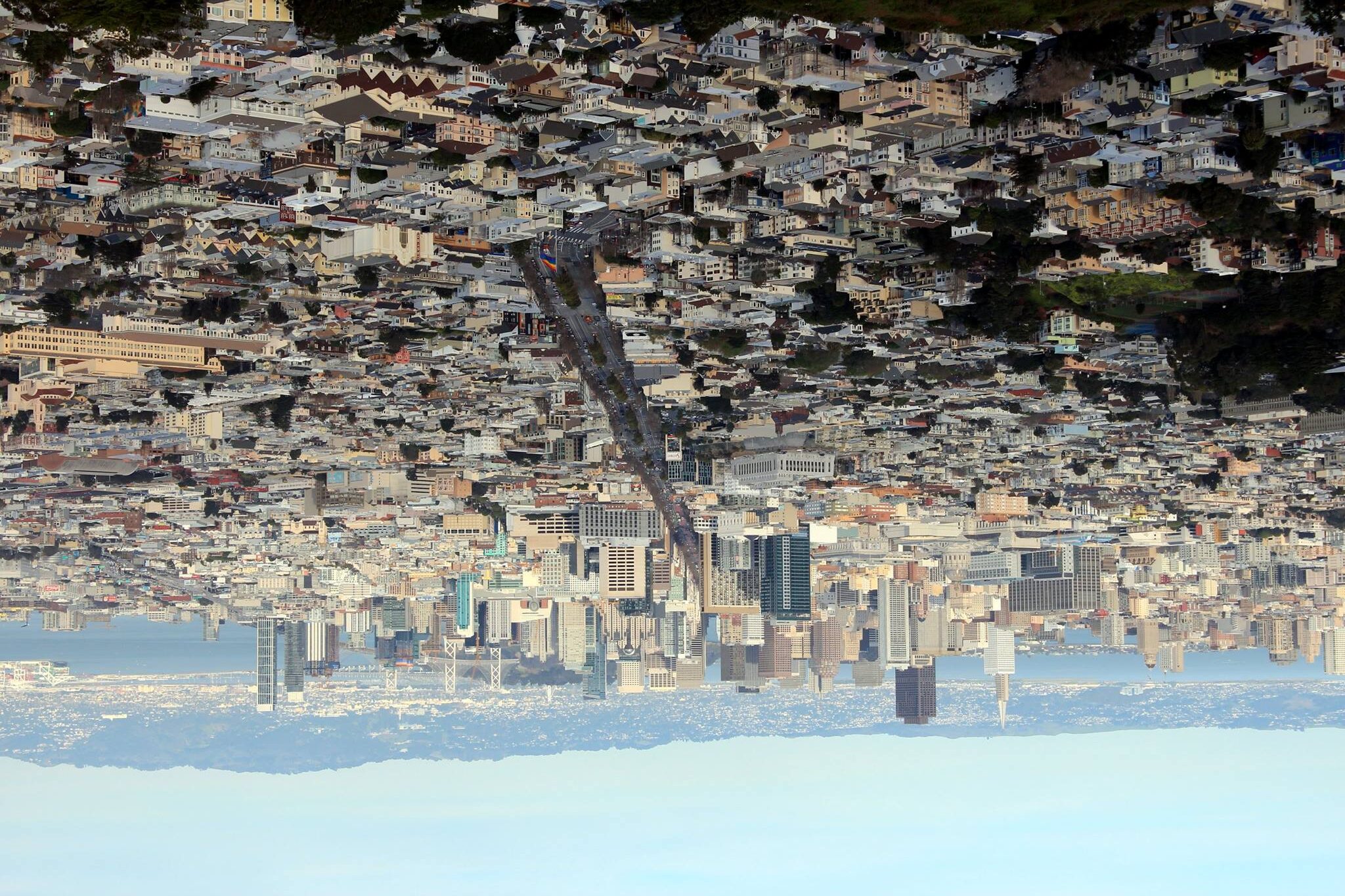 Things feel a little bit upside-down at the moment. San Francisco, 2015
Things feel a little bit upside-down at the moment. San Francisco, 2015 -
Macaque in Mumbai
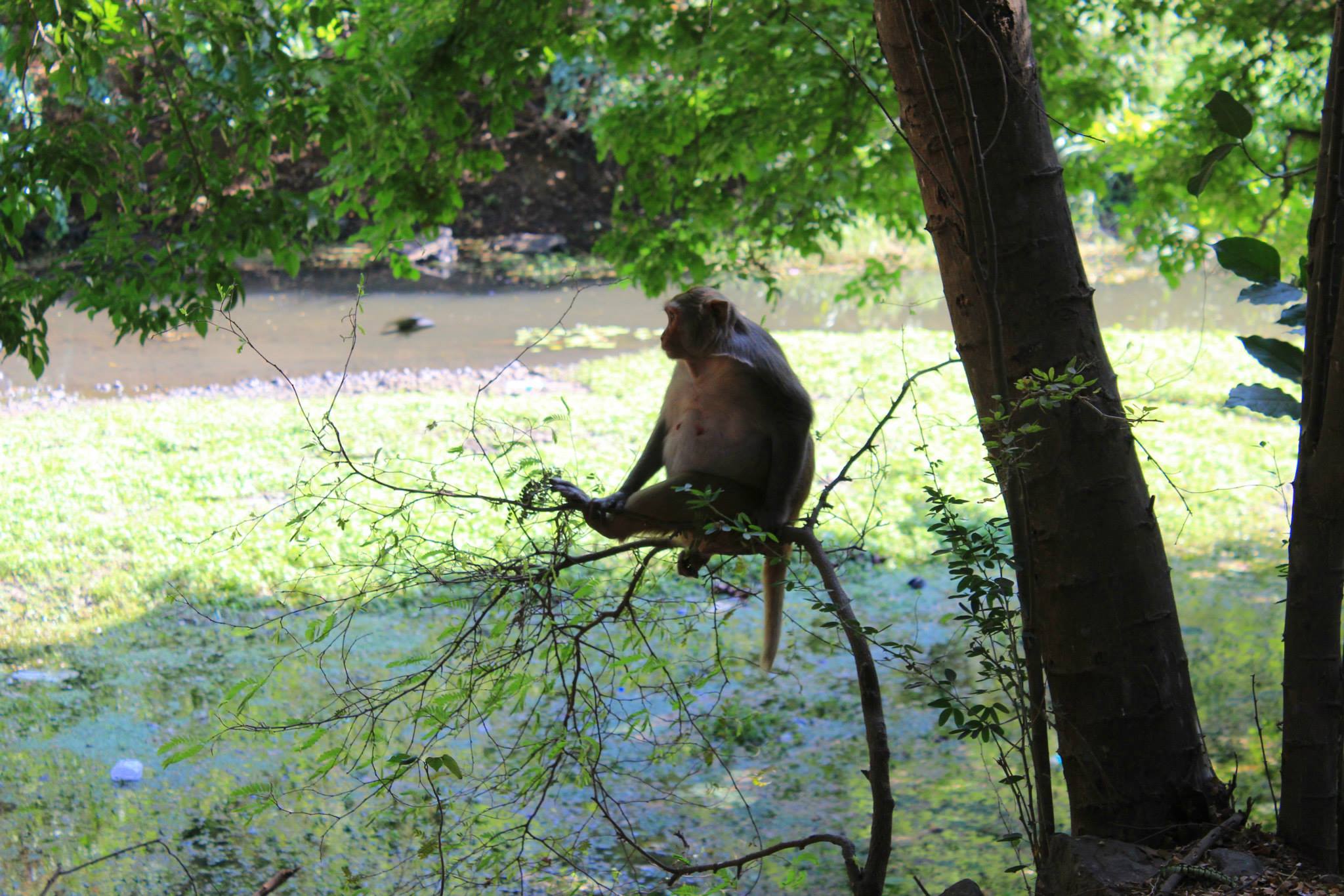 Life is a balancing act. A macaque in meditation, Sanjay Gandhi National Park, Mumbai. May 2014
Life is a balancing act. A macaque in meditation, Sanjay Gandhi National Park, Mumbai. May 2014 -
Masters, Danish Pop, & Silliness
One of the primary ways that I discover new music is through television shows and movies. Largely instrumental tracks from scores that are sprinkled throughout the playlist.
On this point, I recently noticed how I had an unexpected number of tunes created by Dru Masters saved in the collection. A composer I was introduced to via one of my favorite panel shows: Taskmaster. I guess I ended up searching around for more of his themes.
Even in its twentieth series, Taskmaster is still somehow concocting hilarious battlefields for its competitors. If you are unfamiliar with the show, let me drag you out from underneath the rock: a good introduction is simply watching clips of individual tasks (conveniently found on an official playlist) to test your comfort within its comedic waters. Tasks like “Film something that will look impressive in reverse” (S1E2), “Camouflage yourself” (S4E3) or “Physically recreate a video game” (S7E10).
The official channel uploads full episodes as they air and has the full archive, along with a lot of other goodies (including some seasons of its international spin-offs) for consumption.
In general, the tasks have evolved to become more complex over time, but it is heartening to see that Alex Horne is still finding simpler vectors for engineering humor (like, say, walking blindfolded on a spot while following basic instructions; @41:37 of the episode).
-
Running to No End
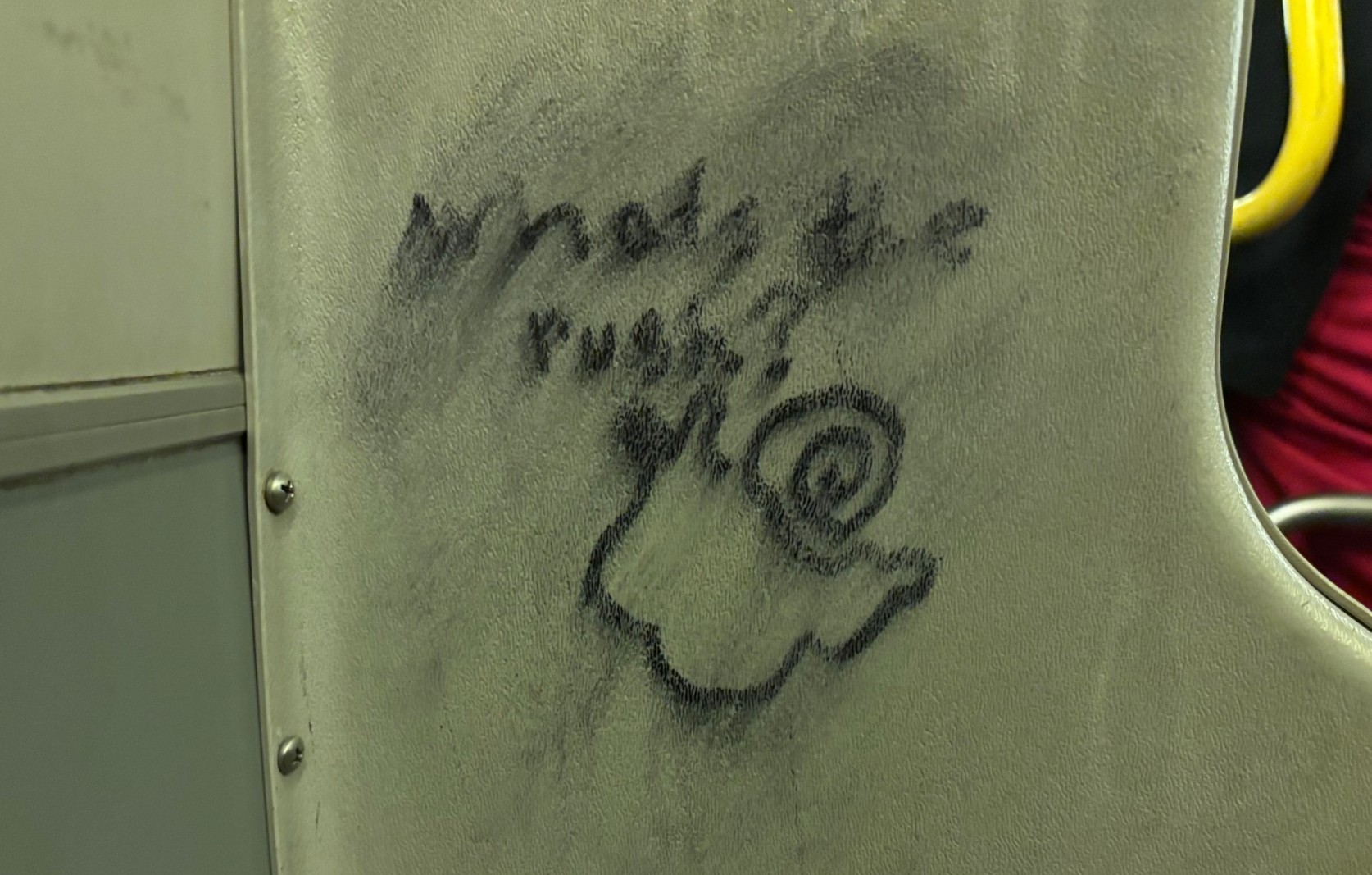 Graffiti seen during a late-night ride on Vancouver transit.
Graffiti seen during a late-night ride on Vancouver transit.A question I often ask.
A sentiment less expressed.
A disposition that too few share.
Impossible to run the rat race at a snail’s pace.
-
The Willy-nilly Era of Digital Trust
In Spring last year, my previous employer fell victim to a cyberattack. As staff, we were notified shortly after, with communication that some of our personal information may have been compromised. The organization set up a dedicated public page to answer frequently asked questions and provide updates on its response. (A similar internal page was also set up.) The standard corporate messaging did little to allay fears and was never transparent about the method of attack used.
(My gut instinct says it was probably a successful phishing attempt—a legitimate-looking email with malicious links or attachments with some language urging action within an immediate time period—but that is pure speculation. The larger the organization, the more diverse its workforce and their familiarity with the quick-evolving digital landscape, the more access points available to hackers.)
Aside from the familiar messaging, the employer contracted both national credit reporting agencies and provided those likely affected with two years of credit monitoring services, including fraud insurance. Unfortunate too, by the way, that Canada only has two agencies of this type, both American-owned, and both with utterly mediocre online tools (honestly, Equifax does not even use multi-factor authentication and neither Equifax nor TransUnion allow credit-freezing in Canada outside of Quebec; what a joke).
I bring this up now because in the past few weeks, I have received a similar notification from a national air carrier, also subject to a cyberattack earlier this year. The key messages are nearly identical to those shared by my previous employer, which is not unexpected. The company has also engaged the same credit reporting agency for protection services, and also for the standard two-year span. At this rate, I will have my information imperiled on an annual basis and have access to complementary credit monitoring for life. An unequivocally sarcastic “Hurray!” to that.
-
Trekking the Southern Cordillera
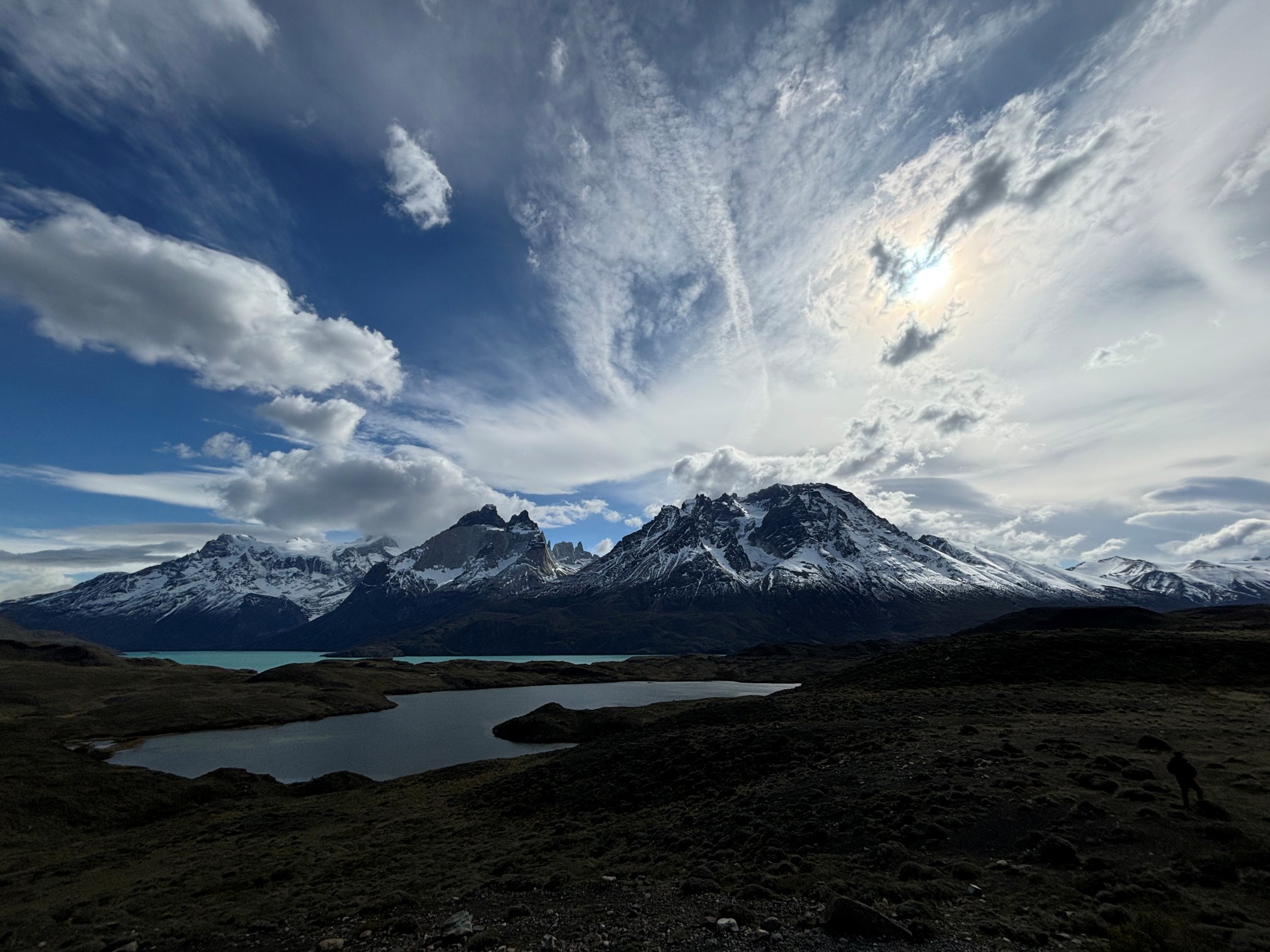
At this time last year, a few friends and I were beginning our exploration of Torres del Paine National Park on the Chilean side of the Patagonian Region. Part of a larger adventure that took us to many remote terrains.
This picture was taken at one of the numerous lookouts along the highway, each with its own hike and unique view of the Andes. We tend to romanticize things, and I definitely had a mixed vacation owing to an illness that lingered throughout, but I still cannot believe that I was there only a year ago. Its memory may as well be a dream, for all its waning impressions.
The upside-down night sky of another hemisphere was an apt metaphor for a most unusual break from waking life. Outrun briefly but not escaped.
If you are curious, you can read my thoughts on the lure of faraway lands (what we seek), pre-trip musings (what we expect), or the more meditative post-trip reflection (on time and its binding nature).
The southern cordillera still calls to me. May the next retreat be as inviting.
-
Wiped Out

This image – of our family’s dog in his preferred state – is an accurate reflection of my current condition. Today’s pic: the pooped pug.
I am at the end of a whirlwind couple of weeks, largely spent in transit around the Lower Mainland. Reconnecting with friends in an attempt to strengthen tenuous bonds. One of my fears is to become memory when I am only a text away; sliding glacially into irrelevance on the tertiary of social circles. Especially as everyone’s narrative gathers pace, or settles, into familiar patterns.
To avoid the idle feat of being forgotten takes energy, often more than I can muster. Though promises made need to be kept and commitments cancelled leave sour aftertastes.
It will all happen again, too soon for this chronic crowd-sidestepper. Wholly tiring yet gratifying, dreaded yet welcomed in equal measure.
-
And/or
Note: In Difference is on hiatus during August, and no newsletter will be sent next month. Updates will resume in September.
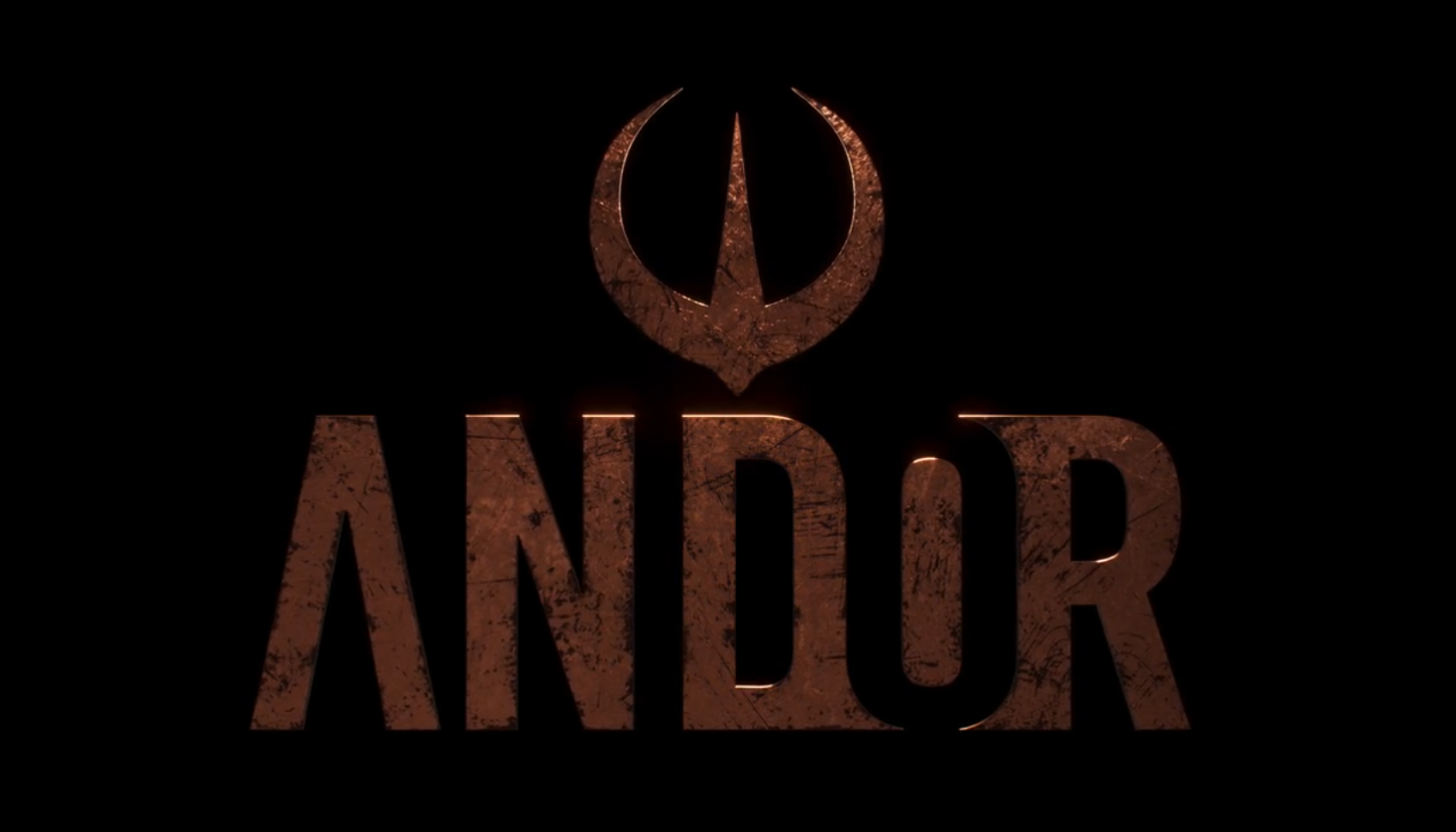
“There is more than one sort of prison, captain. I sense you carry yours wherever you go.”
– Chirrut Imwe, as written by Chris Weitz and Tony Gilroy, in Rogue One: A Star Wars Story
(Spoilers on all things Star Wars related ahead.)
In “Narkina 5”, Episode 8 of Season 1 of Andor, Cassian arrives at an isolated prison surrounded by a lake, on a moon in the Outer Rim. He is greeted by boilersuit-clad guards, one of whom delivers a cold orientation to the facility. The guards, we hear, do not rely primarily on their weapons to keep order. Instead, they lean on routine and “minimally invasive enforcement techniques”, which include an environment capable of sending painful shockwaves through unshielded bodies. Self-policing and self-preservation are entrusted to be key motivators. The prisoners are told to use their time “productively” to avoid harsh punishment.
Cassian is then uniformed and taken to his “level”, a floor of the floating forced labor camp, and mini-factory where a cohort of prisoners is fighting against the clock to complete their tasks. He is given another shot of key messaging by the ‘floor manager’, Kino Loy, a prisoner closing in on his sentence’s conclusion. Institutionalized and assertive, Kino has been installed in the upper echelon of slave ranks, responsible for ensuring those under his purview stick to the script:
Kino: “Listen up. It’s a twelve-hour shift. Productivity is encouraged; evaluation is constant.”
“The seven tallies are the running shift totals of all the other rooms on this floor. You play against all the other tables in this room. I play against all the other rooms.”
Cassian: “Play?”
Kino: “Call it what you will – the point of this conversation is that you understand one thing most clearly. I have two hundred and forty-nine days left of my sentence. I have a free hand in how I run this room. I’m used to seeing my room in the top three on the level. You will want to keep that happening. I’m sensing you understand me.
Sick? Injured? Come and talk to me. Problems with another inmate? I will know before you do. Losing hope? Your mind? Keep it to yourself.”
Cassian is directed to his assigned table and meets the small group of prisoners who have to facilitate his assimilation into the Narkina 5 system. What follows is my favorite scene in the entire series.
-
Alberta’s Fossil Trove
A couple of years ago, I had the pleasure of driving into the Canadian prairies for the first time. (No sarcasm there; I had a companion, and our entertaining conversation was invited to fill the pleasant emptiness of the flatlands.)
The journey had actually begun in Richmond. Eleven hours through winding roads and mountains later, I was in Calgary, to connect with an old friend visiting from the U.K. I had proposed that we drive out to Dinosaur Provincial Park, because it was a bucket list item and because I had no interest at the time in surveying another car city (living in one is bad enough).
We agreed to the plan, met the morning after, and made our way there. It was another two hours or so East from Calgary to the park. Endless farmland, blue skies and scorching sun. The occasional, lonely cloud or tractor interrupting the monotonous land- and skyscapes.
To get to the dinosaurs, you have to zig-zag via gridded farm roads. And just like in the movies, the ancient reptiles leap out at you dramatically. It is genuinely unbelievable how abruptly the fossil-ridden badlands appear. One moment, you are coasting through wheat and pavement. The next, you are descending on rock and gravel as the land around you concaves into another era. Canyons and valleys of unbelonging hills, buttes, and most surprisingly, greenery, emerge from nowhere, evocative of another, older time.
The park is a must-see. The bus tours are largely family-focused but informative for all. It was cool to walk around and see millions of years of our history so accessible; bones protruding from soil as commonplace as the straw-like grass stubbornly staking its claim to the area. It was also clear to understand why the badlands were considered sacred by the local Indigenous populations. Among the many reasons they originally left it undisturbed were the shadows cast by the hoodoos – interpreted as spirits lying in stone. After all, much of what casts shadows is living. People, trees, animals and the like.